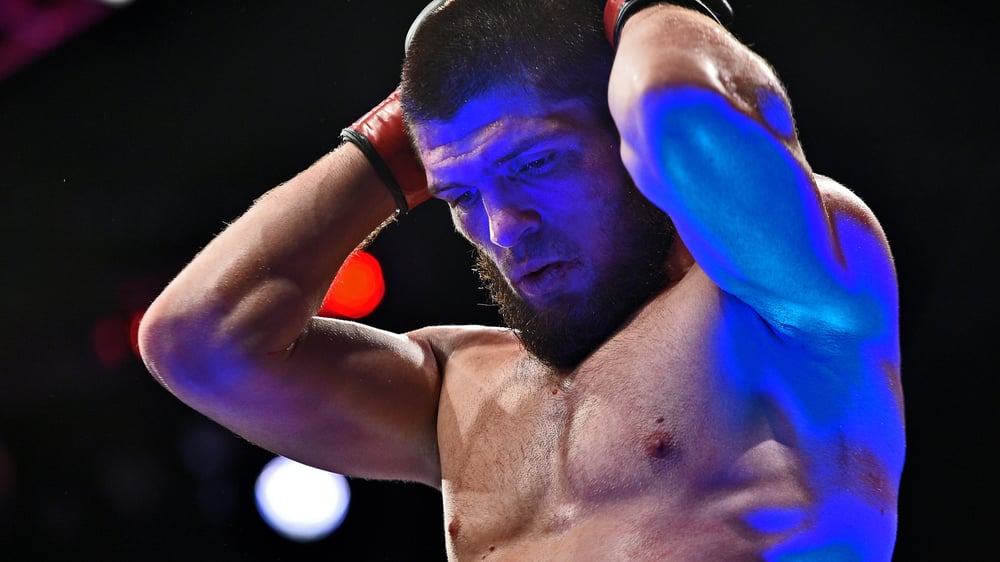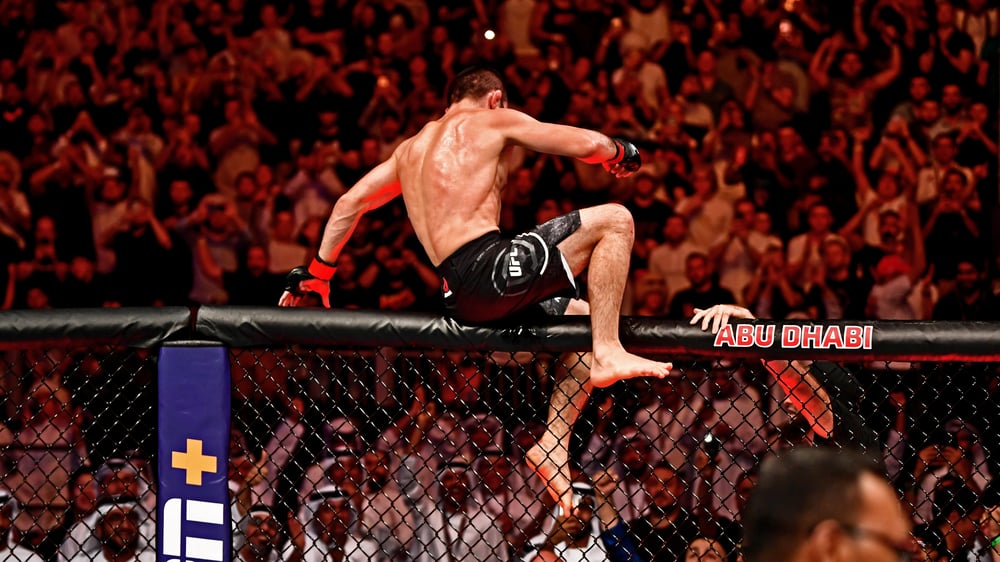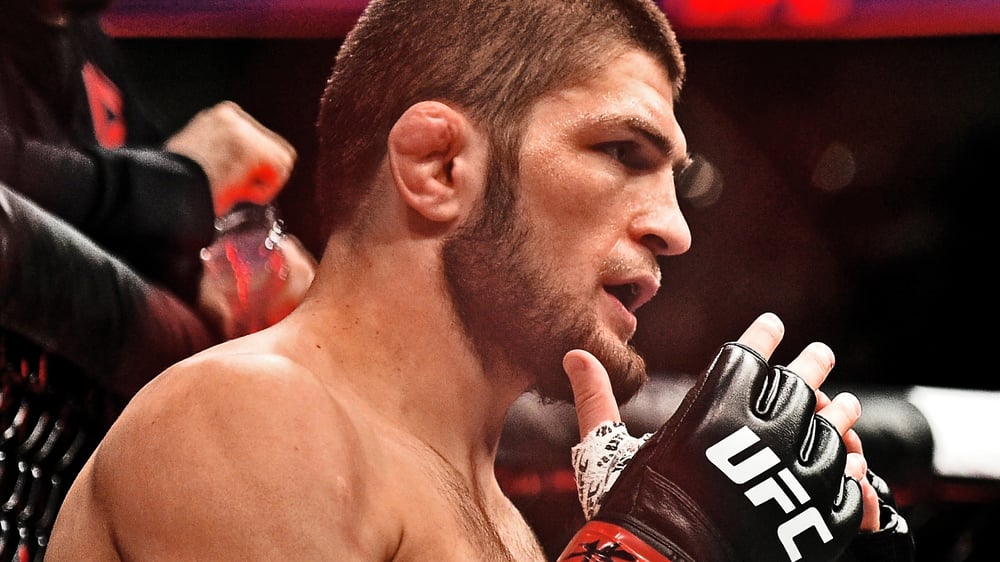
Issue 194
September 2021
There are valuable lessons to be learned from outliers. They’ve achieved unexpected feats, set records, shattered expectations, become gamechangers. Atop the MMA athletes who fit this description is Khabib Nurmagomedov. Having never recorded a single loss, his story is one worth unpacking because it showcases the mental lessons you can use in your own fight game.
A stubbed toe at the same step. A missed appointment. A forgotten name. You make mistakes hourly, but luckily you are also designed to learn through these failures.
Slip-ups teach you where you’ve gone wrong.
Almost nobody can do everything perfectly the first time so it’s these gaffes that give you the feedback needed to take corrective action. You become more resourceful. Seek new approaches. Refine and adjust. But what if you’ve never failed and are undefeated? This notion shatters all that it means to be a garden-variety human. Such is the case with Khabib Nurmagomedov who rolls with a record of 29 wins and zero losses. He’s the UFC’s answer to Michael Jordan, Floyd Mayweather and Michael Phelps, upgraded and rolled into one knockout punch.
When you put his life under the microscope, it’s possible to get a glimpse of the pathway that led to his incredible success. Expert training advice. Genetics. Environment. Family. Faith. Natural talent. While those all count towards the creation of possibly the greatest martial artist ever, there’s one factor that outweighs them all. Mindset. It’s the bedrock of his character that created the drive, discipline and morals which forged a unique champion. It doesn’t matter what he ate for breakfast, he’s always been able to knock the snap, crackle and pop out of his opponents. To celebrate this, we break down the physical and mental practices Khabib employed, consciously and subconsciously, to become the sport’s ultimate champion.

Cast iron self-discipline
Self-discipline is a trait everyone seems to have an opinion on, but the Dalai Lama may have said it best with this quote. “A disciplined mind leads to happiness and an undisciplined mind leads to suffering.”
The mindset that allows you to do things even when you’re just not feeling it, is the bridge between your goals and your achievements. It’s something Khabib unquestionably has more of than anyone because to beat someone in the octagon, you need to first beat them in training. And when you’re a fighter living in a remote mountainside village, it would have been difficult to train with the s bigger picture in mind. This means appreciating that there are people all over the world who are training to beat you to a pulp. Khabib has always had the self-discipline to counterbalance this threat.
“I would wake up, train, then – I had classes,” he is quoted as saying when asked about his routine growing up. “Then I came back home and had some additional classes. After that, I had evening training sessions, came back home, and studied again. And sometimes following all that, I went for another training session at 11 pm, just by myself running in the mountains.” These are the daily habits of a champion.
Self-discipline and control are traits everyone could use a little more of, whether you want to dent the couch a little less and eat more vegetables or stash more dollars into your savings account. The world is built to offer you a carousel of poisonous temptations begging you to cheat on your own goals. Stay in bed. Eat more. Spend everything.
Fortunately, there are some intuitive antidotes to these lures, found a paper in the journal Psychological Science in the Public Interest. They discovered that for a person to develop a powerful sense of self-control you should create a steady set of both incentives and obstacles to your success. So, if you want to eat healthier, then use apps on a new smartwatch to track your food (incentive) or refuse to keep chocolate in the house (obstacle).
If these strategies don’t work, then the researchers suggest you create an “if-then” plan for yourself. This means that if your partner arrives home with a family-sized pizza then aim to already have a plan in place that’ll mitigate your urges to eat it all. Strategize to circumvent temptations and anticipate the triggers that could disrupt your self-control and give yourself rewards for sticking to your guns. You’ll find that like a muscle, your self-discipline can be strengthened over time. Think of it as your walk-out music that will soon play in your head anytime you face an opponent, even if that formidable adversary is as deadly as a strawberry cupcake.

Embracing difficulties
Khabib’s father was the most influential figure in his fight career who put him on track to becoming the undisputed champion. His father was a soldier, wrestler and famous sambo and judo coach who received recognition in the form of Russia’s Master of Sport Award. Hailing from the mountainous region of Dagestan, it was an area that was rife with low-level conflict while Khabib was growing up so you can imagine that his father taught him to prep for the worst.
How do you do create the ultimate warrior? Create an uber-competitive training environment with similarly-minded soldiers. And on the days when you want to level up their skills, you simply call in some of the local wildlife. “Father put me [into] wrestling with [a] bear when I told him, ‘Hey, this bear tried to bite me,” explained Khabib when questioned about the bear rumor. “And I remember when he told me like, ‘Bite him back! No problem. You have to wrestle. You have to keep going.”
Look at the footage online and you’ll realize it wasn’t a play fight. For the bear anyway. While bears weren’t regular features, they served as a life lesson for those situations you feel like you can’t win.
Khabib would live a lifestyle complete with training in the mountains of Dagestan, waking very early in the morning, lifting boulders for weights and training in large groups of other men. This is a stark contrast to the cushy high-tech fight gyms many of the leading fighters use to embrace luxury. The lesson worth learning is that comfort is forever your enemy.
Physically, there’s something you can gain from this approach because lifting boulders like Khabib means you’re working with a non-symmetrical weight. When you practice non-symmetrical lifting or training across uneven surfaces like mountainsides, you’ll find yourself getting ridiculously stronger and fitter.
To execute this, grab a barbell and stack a 20kg plate on one end and a 10kg plate on the other. It should look like a mistake a novice might make. Start with a small percentage of differences, such as 5-10%, but over time you can increase the differential. You’ll get more tired because when you throw symmetry out you become a lot weaker, so by training in this method you become stronger. When you return to evenly loaded bars, you’ll be more powerful because you’ll have built more core strength. This doesn’t make you stronger –it makes you a lot stronger. Life rarely provides symmetrical objects to lift so this will give you real-world power that will create beast-like improvements to your fight game.
Mentally, anyone who celebrates adversity and actively seeks difficult tasks will always be rewarded. When you do this then everything else will feel easier. Whether it’s a cold shower. Sprinting that hill. Eating bland kale. They all count to develop a mindset that excels when the going gets tough.
You’ll be happier and more successful for it too, explains research in the Journal of Personality and Social Psychology. People who have overcome and lived through traumatic experiences tend to have lower stress levels and higher life satisfaction. They’re not sure why, but perhaps it’s because tough situations give you a sense of perspective. Not only does adversity equip you to deal with negative events but it can help you appreciate how easy you’ve got it.
Just wear no shoes on a walk and you’ll appreciate your worst pair far more. You wouldn’t want to seek out dangerously difficult situations, like trying to pat a bear cub while momma bear looks on. However, if you choose a simple life that regularly forgoes creature comforts, like that extra clothing layer when you’re running on a snowy day, you’ll be tougher, happier, and healthier for it.
Rock-solid mental strength
The true test of the power inside Khabib’s mind was shown to the world when he retired following his father’s death.
He famously said, “No way I’m going to come here without my father. It was first time after what happened with my father, when UFC called me about Justin, I talk with my mother three days. She doesn’t want me to go fight without my father, but I promised her it was going to be my last fight. If I give my word, I have to follow this. It was my last fight here.”
It’s rare for money not to be a driving factor for any athlete and he has refused the $100 million offers he is currently receiving to come out of retirement. This is all based on a promise he made that’s forged in respect for family and faith. To show a commitment to your word despite massive monetary rewards, is testament to his mental strength.
Creating a brain with knockout power is something anyone can achieve, regardless of how trying a situation you find yourself in. That’s because being tough during sport, starts with being tough off the field. How? A paper in the Journal of Cognitive Enhancement may have the answer. They found student-athletes who were under pressure to perform both in sports and academically benefited from focusing their attention on the present moment where they observed their own thoughts and feelings without reacting emotionally.
Practice dealing with what’s in front of you, without worrying about past or future events and you’ll begin to find how mentally tough you can be. In a nutshell, it’s the act of training yourself to be mindful and it will help you stay calm when those around you lose their heads.

Putting faith first
Khabib is the first Muslim to win a UFC title, an achievement he’s very proud of, never missing a chance to cite his faith as his driving force.
“The most important (thing) for us is to stay connected with God, (it) doesn’t matter what happens with you, you always have to pray,” he explains. “You always have to stay humble and stay focused and stay connected with God. This is very important for us.”
Islam is the religion of his family and admirably his faith has always come before his fists. This has contributed to his routine of training, prayer, eating and sleeping. It’s given him a compassionate mindset that drives him to become a shining example who acts like a champion in an out the cage.
Yes, there may have been the odd McGregor-driven indiscretion to taint this record, but nobody is perfect. He’s remained largely scandal-free thanks to his devotion to Allah. This has made him an ambassador the world over for the Islamic faith, a role he relishes. These morals and virtues appear to have kept him on the right path because he believes firmly in family values. It’s had a knock-on effect because he’s always treated his body with the utmost respect, and this shines through in his how he lives.
Regardless of what you believe, faith is something that’s scientifically proven to make you a better sportsperson. For instance, a study in the Journal Of The National Medical Association found group weight-loss programs are more likely to be efficacious if the program meets in a church and if they have less experience with weight loss.
For many believers, religion is a source of optimism, promoting a sense of togetherness and belonging. This is just one aspect of faith because it gives believers the sense that they’re being cared for.
“When Allah is with you, nobody can beat you – you have to believe this,” says Khabib. It’s Khabib’s devotion that’s given him the confidence to cope with the stresses of competing at the highest level so that he can let go and focus on high-level performance. Smart move because according to a 2000 study conducted by Jeong-Keun Park of Seoul University, prayer – at least for Korean athletes – isn’t just a key factor in coping with anxiety but may also help peak performance.
By finding a coping mechanism for pre-fight jitters, the psychologists theorize, athletes enhance their ability to play or perform more in the moment. It’s this unwavering resolve in the face of adversity that has created a world-beating athlete like Khabib. How? Well, the distinguishing difference between champion athletes and low achievers is the former’s determination to come back to their sport stronger following an injury or failure, whereas the latter were surprised by their failures and lost passion, found research in Frontiers of Psychology.
Not that Khabib has had many failures in the ring, but he certainly has had plenty of setbacks in the form of injuries to his feet, knees, and ankles. The confidence that a higher power has been helping him get back to his best form has unquestionably offered a mental boost that’s helped him through the tough times.
Mark of a man
Khabib truly is a one-off fighter and not one for mass production. His discipline, morals, upbringing, and faith created someone who is both humble but also a master of his craft. His journey to reach the highest level of the sport started at the age of eight after being inspired by his father to compete in martial arts. Motivation to compete was probably quite easy to find when you consider he had a live-in coach, in the form of his dad as well as an older brother. They no doubt created the drive to train in the gym that his father created beneath their house.
Living in close quarters to a competitive environment coupled with an emphasis on being stoic in the face of adversity created a man who would do almost anything to succeed. His is a story full of lessons, humility and character that would make the founders of all martial artists proud to see a man like him practice their respective crafts. Tip your papakha to him because his career path is one that is unlikely to ever be repeated.
By Ray Klerck
...









